Create a WhatsApp Template from Fyno
You can create a WhatsApp template and send it for Approval from Fyno itself. To do so, go to Templates -> External -> WhatsApp. Click Create. It will open up the below popup.
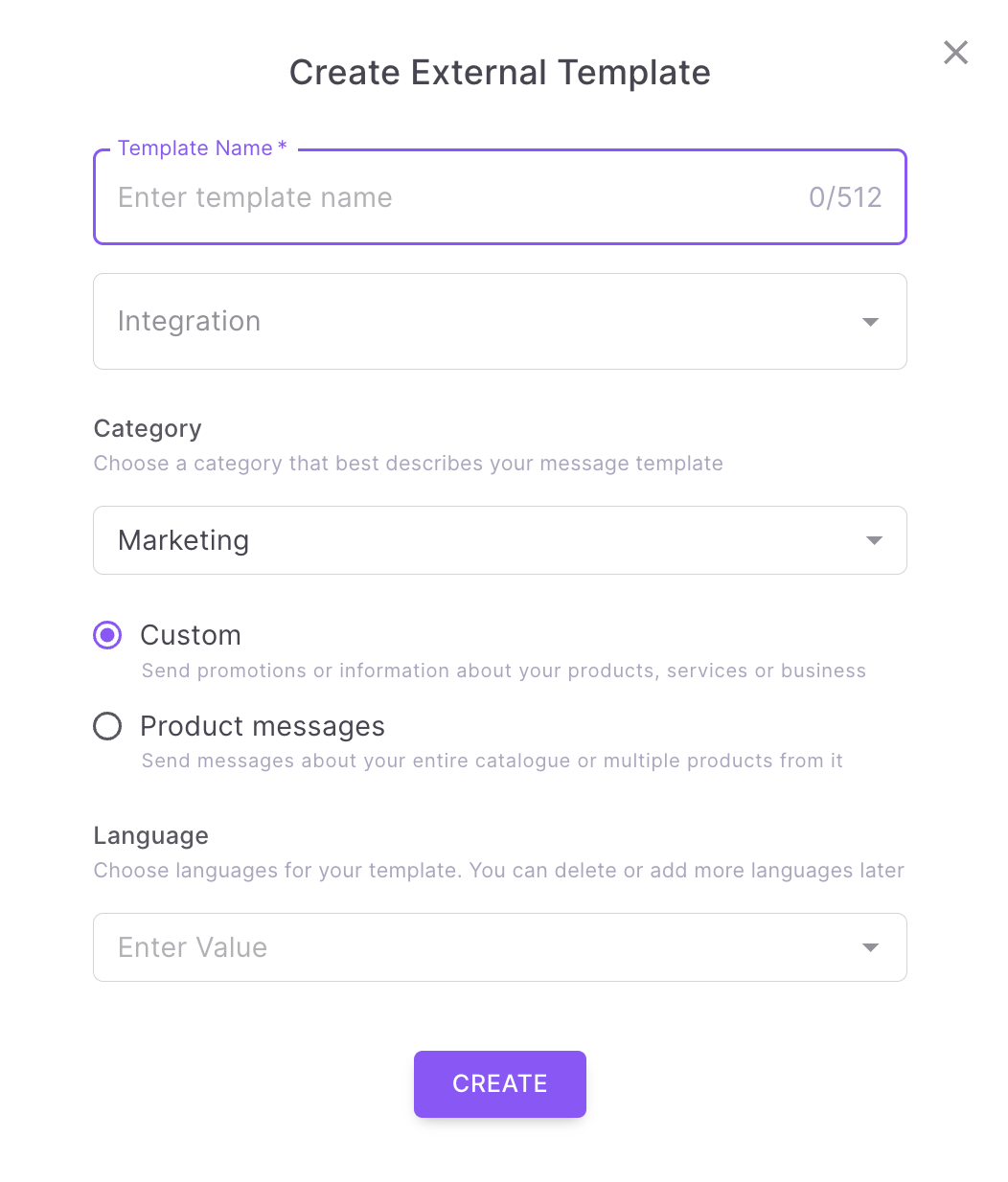
- Template Name - Give a unique name for your meta template. Template Name can only have small case characters, numbers and underscores - '_'. eg: meta_template_1.
- Integration - Select from the list of integrations from the dropdown. Please make sure you have configured at least one Fyno WhatsApp integration
- Category - Refer this meta document for examples
- Marketing - Select this option if you want to send promotion or information about your product, services. Enables you to achieve a wide range of goals, from generating awareness to driving sales and retargeting customers. Examples include new product, service, or feature announcements, targeted promotions/offers, and cart abandonment reminders.
- Custom - Used to send promotions or information about your products, services or business
- Product Messages - Used to send messages about your entire catalogue or multiple products from it
- Utility - Select this option if you want to send notifications about existing order or account details. Enables you to follow-up on user actions or requests. Examples include opt-in confirmation, order/delivery management (e.g., delivery update); account updates or alerts (e.g., payment reminder); or feedback surveys.
- Marketing - Select this option if you want to send promotion or information about your product, services. Enables you to achieve a wide range of goals, from generating awareness to driving sales and retargeting customers. Examples include new product, service, or feature announcements, targeted promotions/offers, and cart abandonment reminders.
- Language - Choose languages for your template. You can delete or add more languages later.
- Click Create.
You will see the template creation page as below.
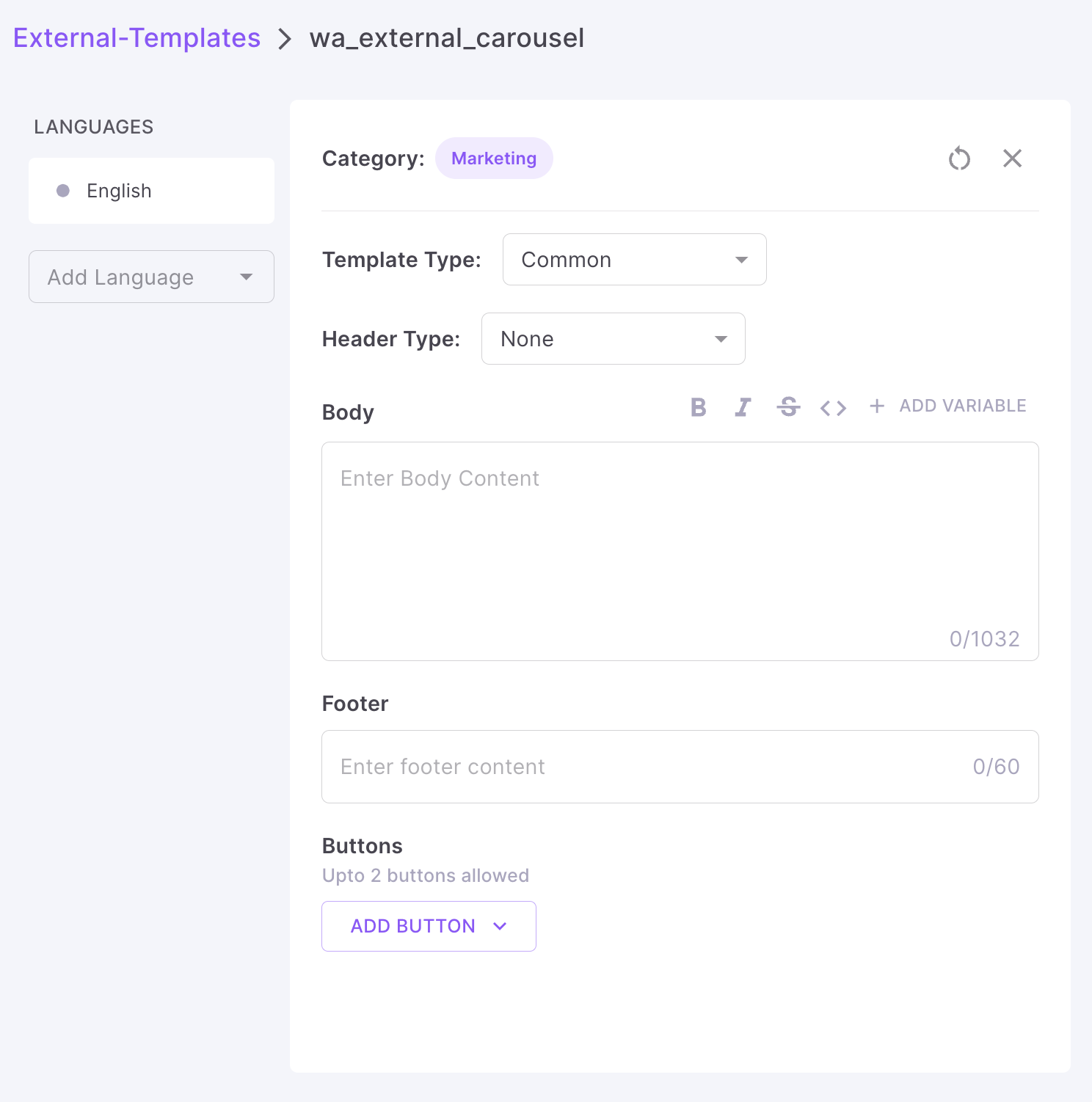
-
Template Type
- Common - Select this for template types except Carousel
- Carousel - Select this if you want to send Carousel in the message. Currently its supported by the following providers - Meta, Fyno Whatsapp, Fyno x Kalerya, Fyno x Valuefirst.
This doc explains how to create a Common Template type. You can refer how to create Carousel Template type here.
-
Header (optional) - Add a title or choose which type of media you'll use for this header.
-
Text - Enter the text which will appear in template header when sent to users. In the below example, Header content is Our {{1}} is On!. Add a value for variable {{1}} as 'Winter Sale'. The changes can be seen in the Preview section.
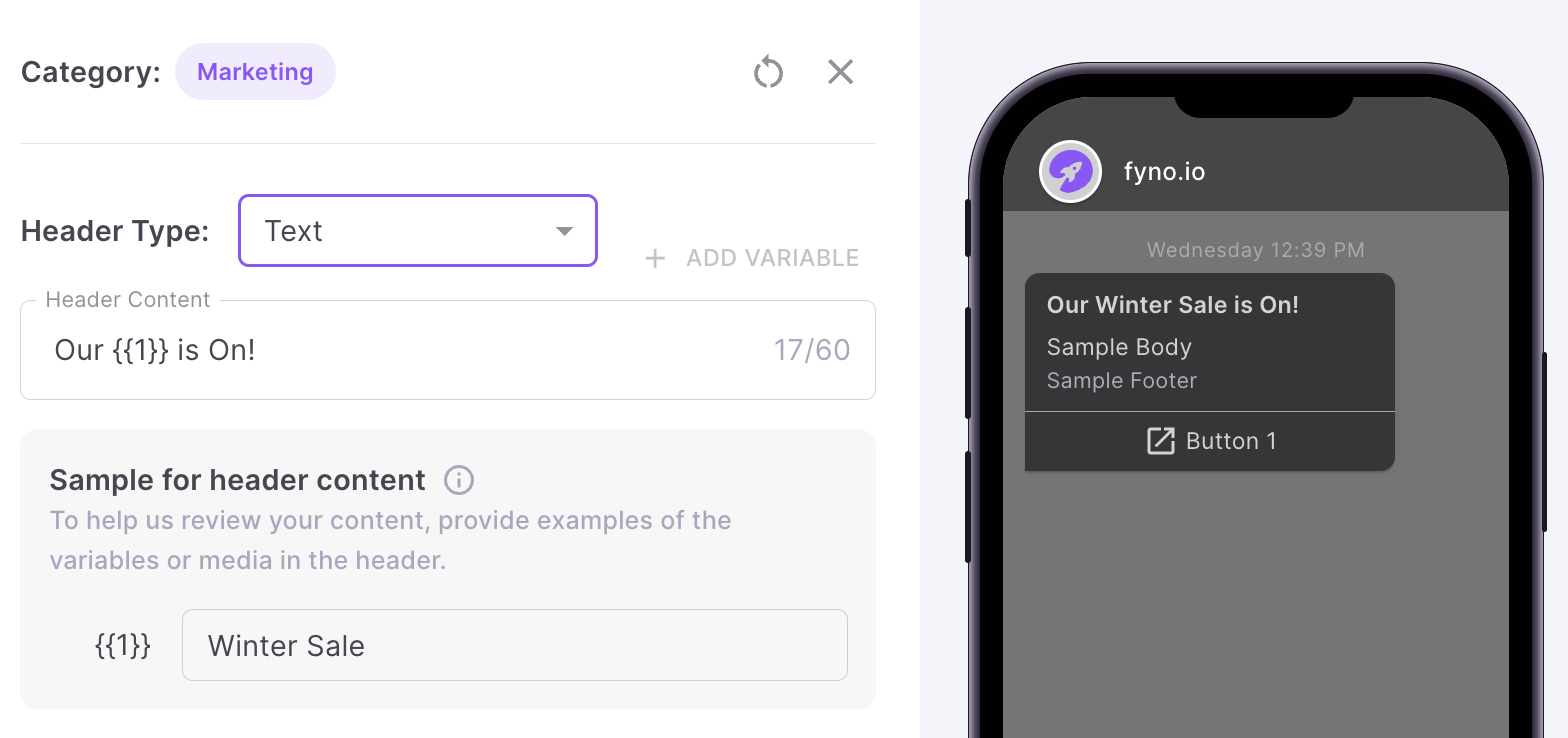
-
Media - Media headers can be an image, video, or a document such as a PDF.
- Image - You can add any JPG or PNG file. Maximum file size allowed is 5 MB.
- Video - You can add any mp4 file. Maximum file size allowed is 16 MB.
- Document - You can add any pdf file. Maximum file size allowed is 100 MB.
Adding a variable in the header is optional. You have the option to include only one variable. The maximum permitted character limit for the header is 60 characters.
-
-
Body - Enter the text for your message in the language that you've selected. Maximum limit is 1028 characters without variables and with each variable added it increases by 4. For example, if you have 2 variables in body content, then maximum character limit is 1036.
-
Footer (optional) - Add a short line of text to the bottom of your message template. Maximum limit is 60 characters. Footer does not support variables.
-
Buttons (optional) - Create buttons that let customers respond to your message or take action.
-
Quick Replies
-
Custom - Allows your customer to return a simple text message.

-
-
Flow - Flow allows you to create trigger a Meta flow from WhatsApp template.
-
Button Title - Add a text which the users will see in their WhatsApp message as a button.
-
Flow ID - A unique Id generated by Meta for every flow created.
-
Flow Action - Flow Action could be Navigate or Data Exchange.
-
Navigate Screen - If you choose Navigate, then you have to provide the First Screen name of your flow.

-
-
Call to Action - Call-to-action buttons allow customers to call a phone number or visit a website (e.g., payment link, order tracking link etc) at the touch of a button. A template can have a maximum of four call-to-action buttons, 2 “visit website”, 1 “call phone number” and 1 “copy coupon code”.
-
Visit Website - URLs in Call-to-Action buttons can either be static or dynamic. If you want to use dynamic URLs, you will need to provide the static part of your URL with a variable when submitting your Message Template. You can then append the suffix variable when sending your Message Template. Example for Dynamic URL - https://example.com/static_url/{{1}} . If you want to track URL clicks or you want to shorten a URL, you can use Fyno Shorty. To use the same, you need to add Website URL and Sample URL as shown below. In the below example, download_url is a placeholder, which you will configure while creating Fyno template.

-
Call Phone Number
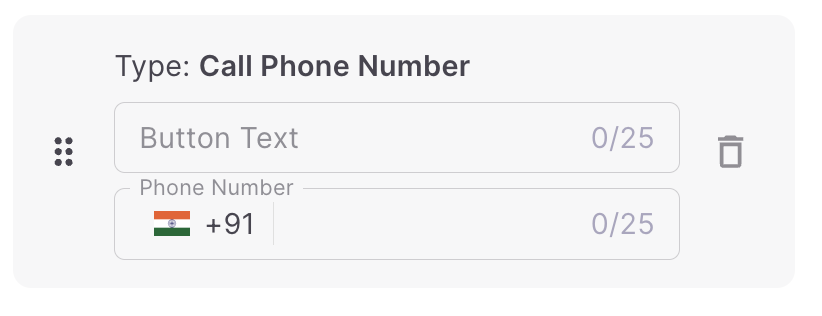
-
Copy Coupon Code

-
-
-
Click Save and Promote to save the change and push it to Live version.
Variable Validation
- The variables in the body content must follow an increasing order. For instance, it should be formatted as "hey {{1}}, this is {{2}}" and not "hey {{2}}, this is {{1}}".
- Variables have to be numbers and not applicable for Handlebars.
- The ratio between words and placeholders is defined as 2x+1 : x, where 'x' represents the number of variables.
Meta Approval
- Once you have saved your template, you will see the below popup. Clicking 'Send for Approval' will submit this template to Meta for approval.
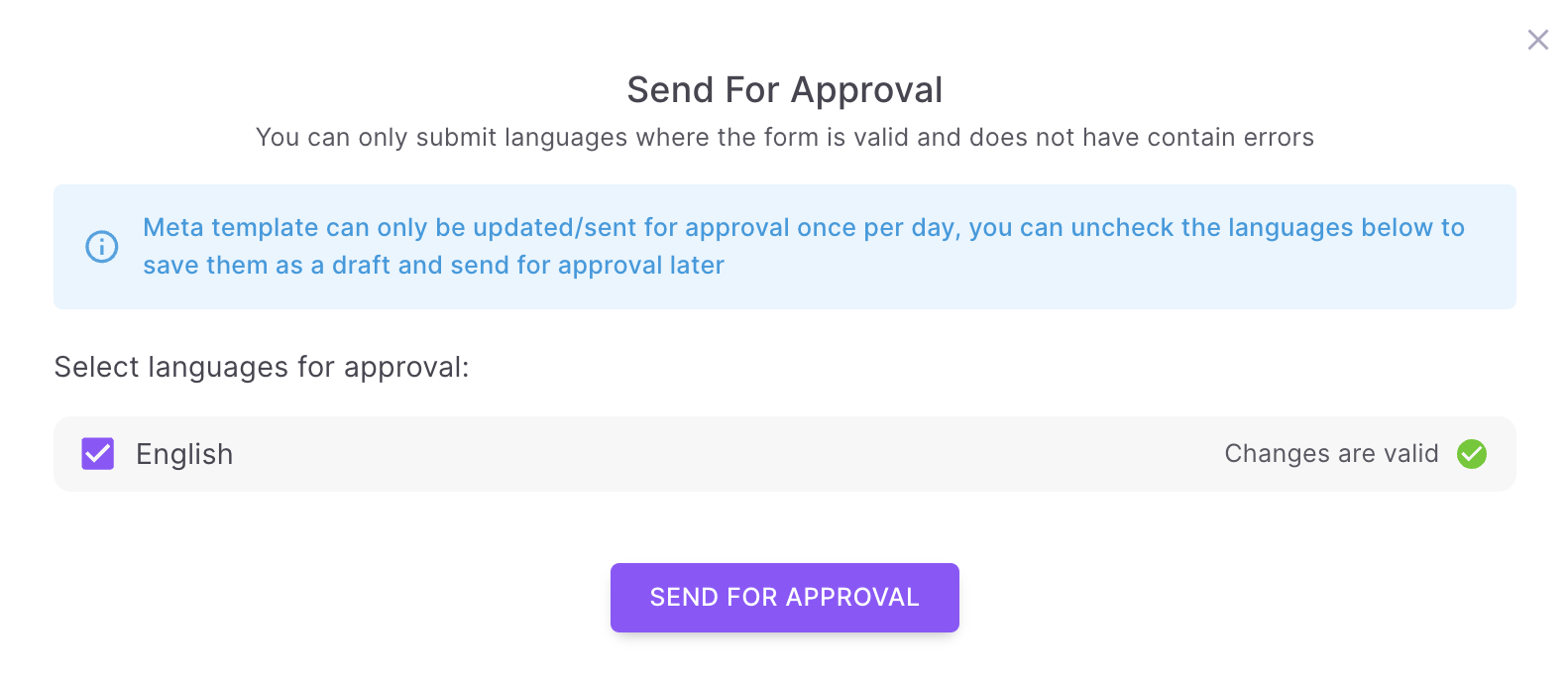
-
You will see the submission status as below. You will only see response for languages that have changes and saved as draft or are sent for approval. For example, if you have 3 languages and you changed content of hindi template and saved it in response I will only see Hindi language’s response.
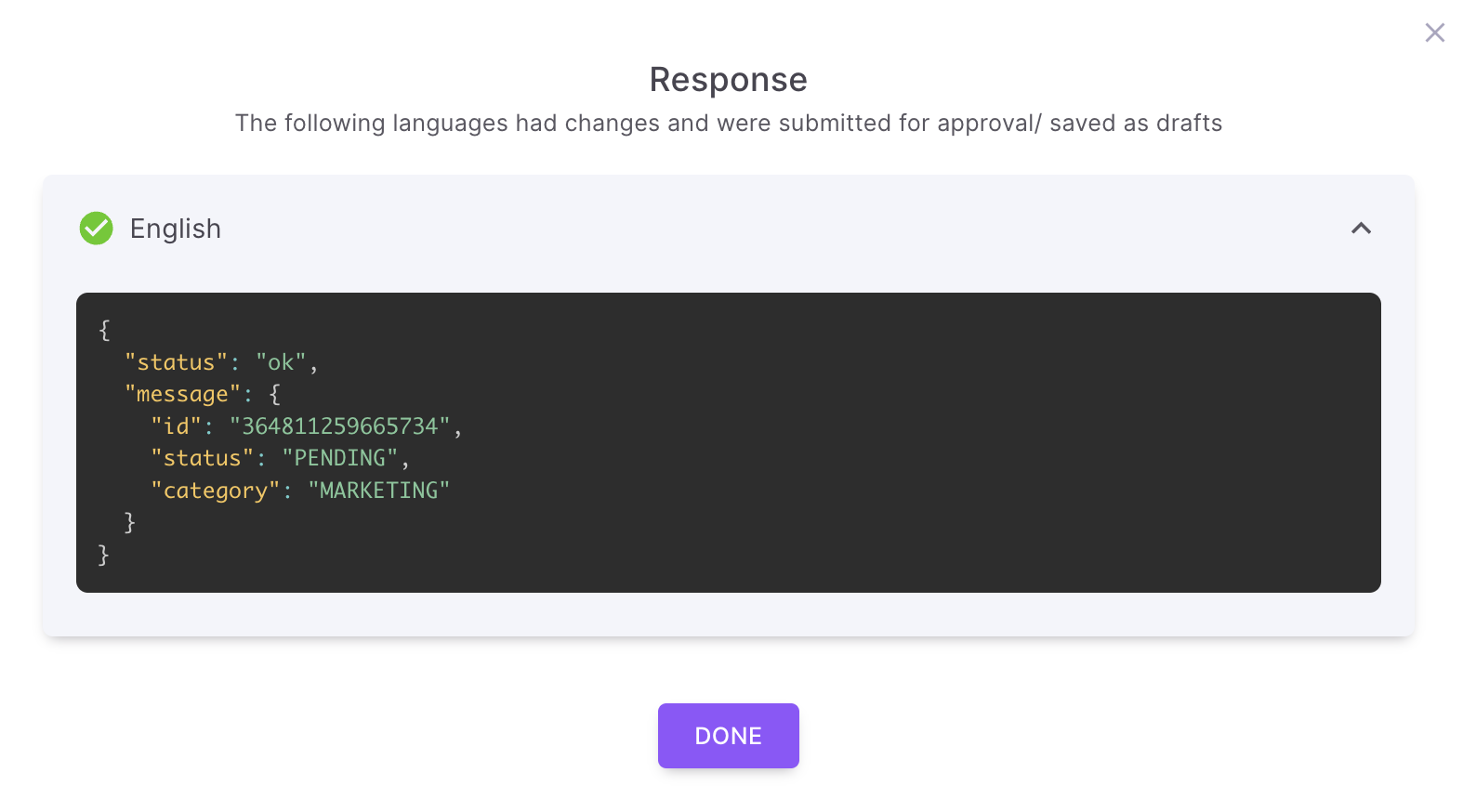
-
In the External Template page, you will see the new template created along with the status. Once the status is approved or rejected by Meta, you will see the status updated in this page.

| Status | Meaning |
|---|---|
| Pending | Indicates that the template is still under review by WhatsApp. Review can take up to 24 hours. |
| Approved | The template was approved by WhatsApp and can be used to notify customers. |
| Rejected | The template has been rejected by WhatsApp during the review process. |
| Paused | The template has been paused by WhatsApp due to recurring negative feedback from end users, typically resulting from "block" and "report spam" actions associated with the template. Message templates with this status cannot be sent to end users. |
| Disabled | The template has been disabled by WhatsApp due to recurring negative feedback from end users or for violating one or more of WhatsApp's policies. Message templates with this status cannot be sent to end users. |
How to save template as Draft
To save a template as a draft before submitting it for approval, follow these steps.
- Once you click 'Save' in the template page, you will see the below popup.
- Uncheck the language for which you wish to save the template, then click 'Submit'. This action will save the selected language as a draft. You can also see this template status as 'Draft' in External Template page.
- You can edit the template and submit for approval later.
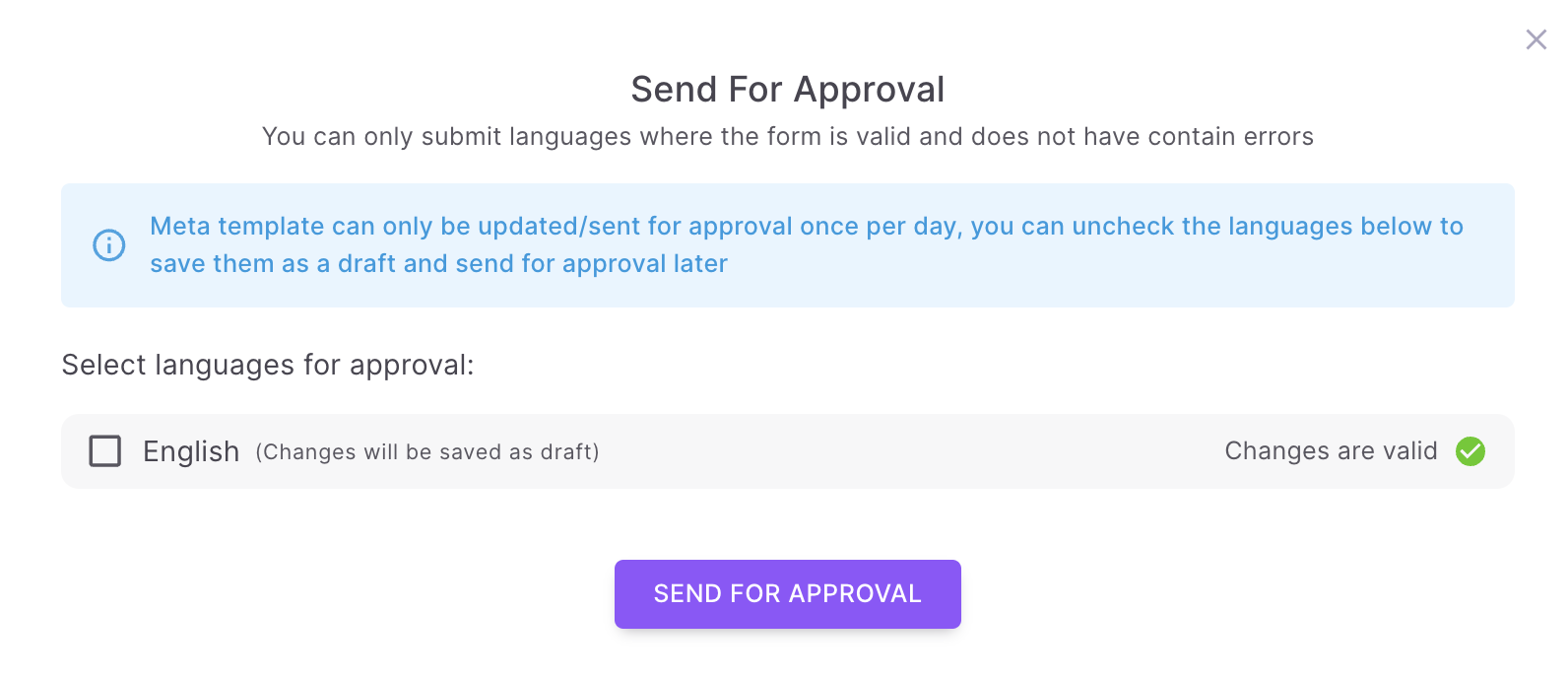
Common Rejection Reasons
Submissions are commonly rejected for the following reasons, so make sure you avoid these mistakes.
- Variable parameters are missing or have mismatched curly braces. The correct format is {{1}}.
- Variable parameters contain special characters such as a #, $, or %.
- Variable parameters are not sequential. For example, {{1}}, {{2}}, {{4}}, {{5}} are defined but {{3}} does not exist.
- The message template contains content that violates WhatsApp’s Commerce Policy: When you offer goods or services for sale, Meta consider all messages and media related to your goods or services, including any descriptions, prices, fees, taxes and/or any required legal disclosures, to constitute transactions. Transactions must comply with the WhatsApp Commerce Policy.
- The message template contains content that violates the WhatsApps Business Policy: Do not request sensitive identifiers from users. For example, do not ask people to share full length individual payment card numbers, financial account numbers, National Identification numbers, or other sensitive identifiers. This also includes not requesting documents from users that might contain sensitive identifiers. Requesting partial identifiers (ex: last 4 digits of their Social Security number) is OK.
- The content contains potentially abusive or threatening content, such as threatening a customer with legal action or threatening to publicly shame them.
- The message template is a duplicate of an existing template. If a template is submitted with the same wording in the body and footer of an existing template, the duplicate template will be rejected.
How to create multi-language template
You can add templates for multiple languages from the same template creation page and send them for Approval together or one by one. You can ado that selecting language from Add language drop down.
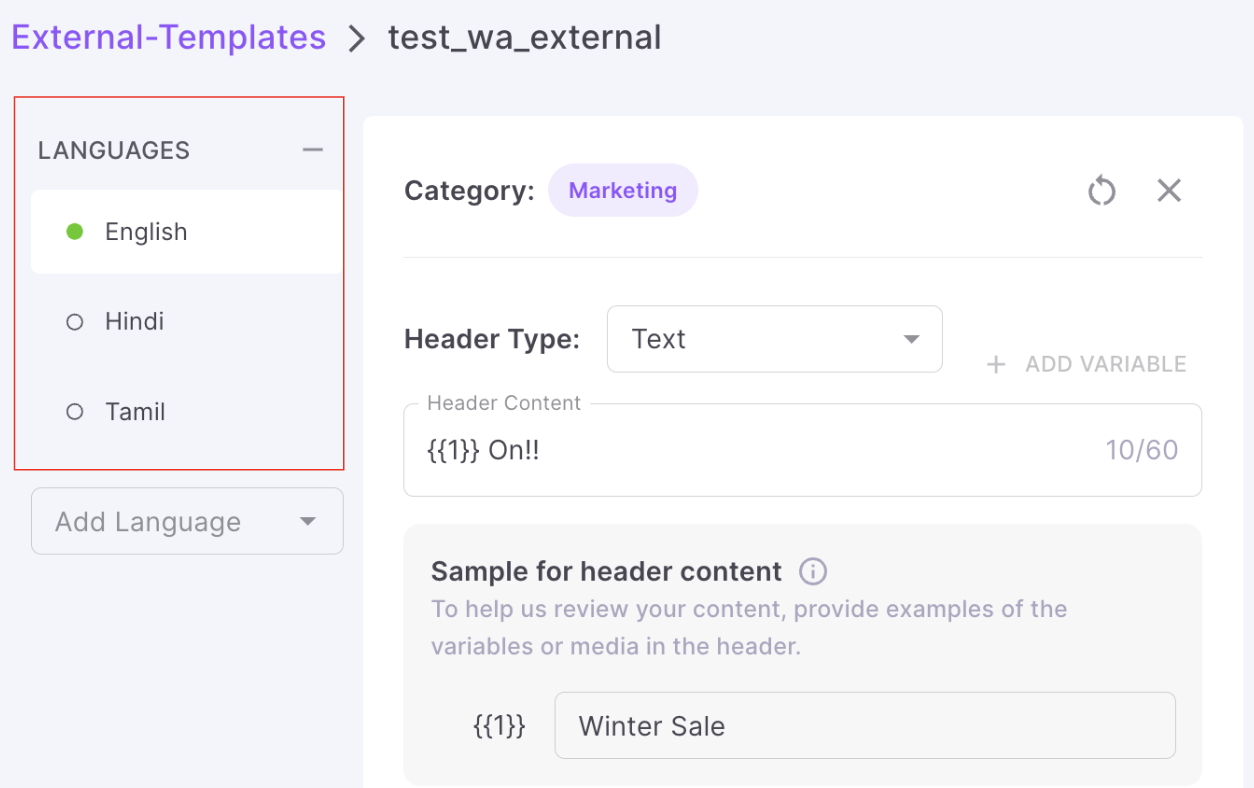
In this example, we have created the same template in multiple languages, English, Hindi and Tamil. If there are any validation issues in the template, you will see an error as shown below for Tamil language. In such cases, go back to template page, fix the errors and send it for approval.
Once you have submitted the templates for approval, you can track the same in External Templates page.
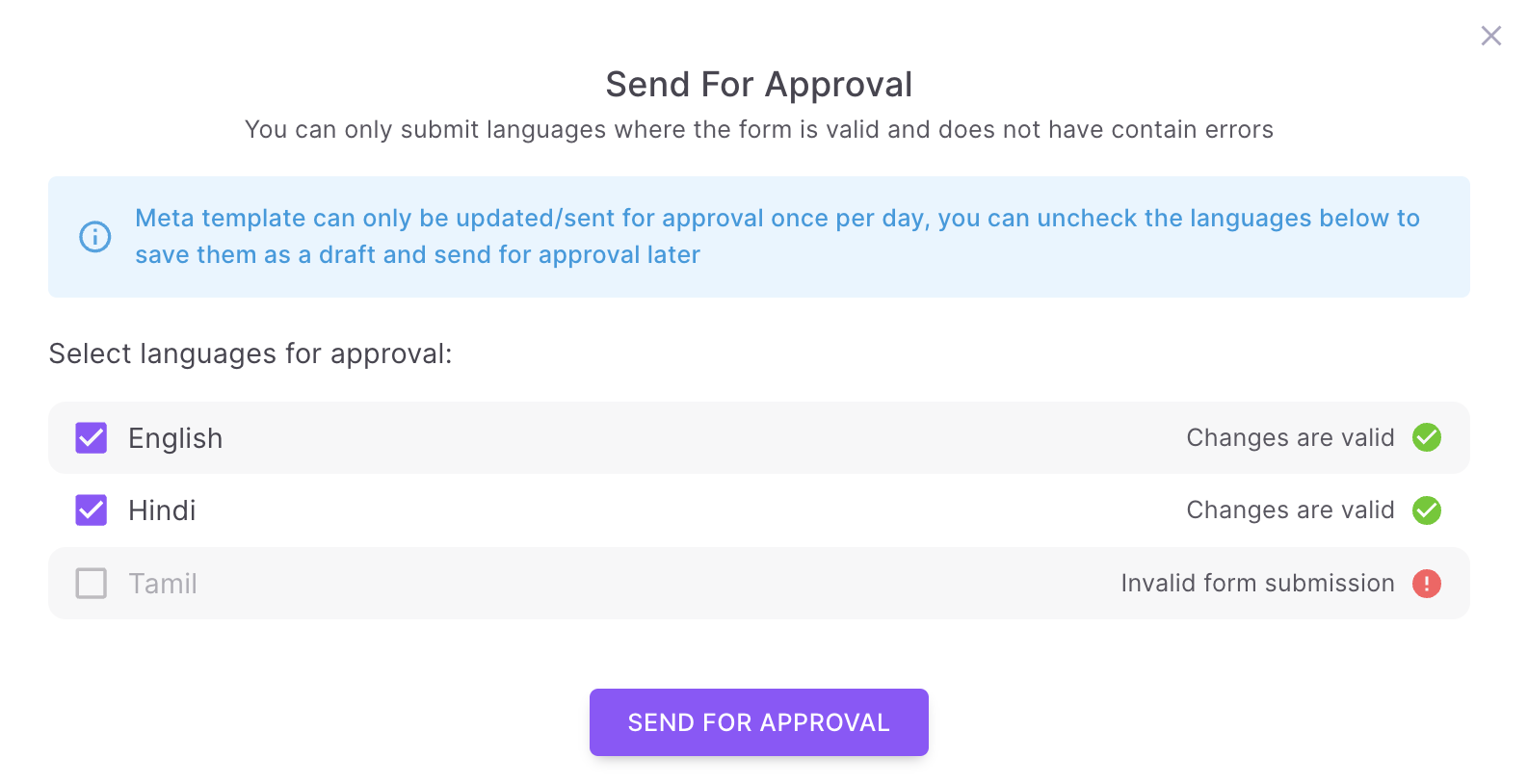
Meta imposes restrictions on template updates, limiting them to once per day and no more than 10 times in a month.
Updated 5 months ago
